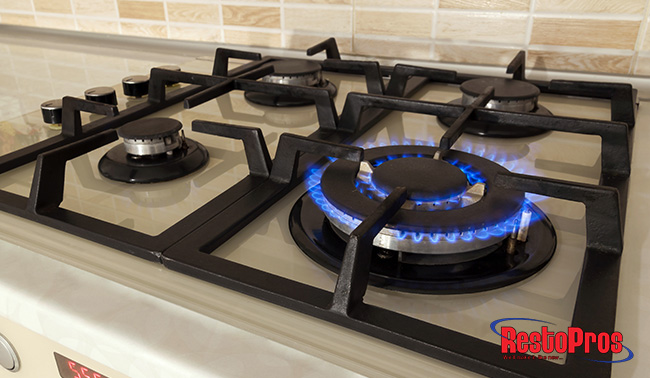
Having a hot, home-cooked meal is great, but calling the fire department to stop your house from burning down? Not so much. It’s easy to get distracted in the kitchen with so many things going on, and sometimes accidents happen. If you’ve ever had a grease fire (or wondered what to do in the event of one), you’ve come to the right place. The experts at RestoPros are about to run down the list of best practices of prevention, mitigation, and restoration! Here’s what to do during a grease fire:
How to PREVENT a Grease Fire
The best way to handle a crisis is to avoid it entirely. Having something that creates intense heat, like a stovetop in a kitchen, is a recipe for disaster if left unattended or handled without due caution. If you’re ever cooking with oil, try and adhere to the following simple precautions:
- Don’t leave things unattended. The leading culprit of fires in the kitchen is unattended cooking.
- Clear flammable items from the stovetop area. Cloth and paper towels, oily items, containers filled with oil, etc. do not react well to a glowing hot metal coil or flame burner.
- Try to avoid placing overly moist foods into hot oil. Water and oil don’t mix well. Wet, oily foods can at least cause an unpleasant splashing in the immediate area, and at most cause a type of spillover of steam vapor and oil. In that case, they may come into direct contact with heating elements, causing an almost instant fireball.
- Heat oil slowly, and add food slowly. This will easily prevent oil from overheating and splashing out onto unintended areas.
- If you see smoke or smell an acrid odor, turn the burner off. Smoke means oil is burning. Every type of oil can burn, and the temperature at which oil ignites is called its flash point. You can check the flash point of the oil if you’d like, but smoking oil or an acrid scent is a helpful warning. Carefully remove the pot or pan and wait for it to cool before continuing.
Being present in the kitchen and having awareness of heating elements is 90% of the battle!
What to Do During a Grease Fire
If you’re ever in the unfortunate situation of handling a grease fire, it’s okay! There’s still plenty that can be done to keep it contained.
First, let’s talk about the things that should NOT be done:
What Not to Do During a Grease Fire
- DO NOT put water on a grease fire! It’s a rather intuitive response. Everyone knows fire doesn’t like water. The fastest way to kill a flame is to douse it in water, but grease fires would be an extreme exception to that rule. Dropping water onto a grease fire will cause a massive fireball of flaming oil that has the potential to ignite everything in the vicinity.
- DO NOT swat a grease fire with a towel or cloth. This action will fan the flame and spread the fire at best, and at worst catch the towel on fire.
- DO NOT try and move an item that has a grease fire in/on it. Tossing a pan or pot into a sink might seem like a good idea. A sink won’t catch fire after all, and the fire can burn itself out in the comfort of its new stainless-steel home. The problem is all the things between you and the sink—like rugs, carpet, curtains, towels, cabinets, countertops and what you’re wearing—might not be. Trying to quickly but calmly carry a hot, sudden fireball at arm’s length, without splashing droplets of flammable oil, isn’t impossible … but it certainly isn’t easy.
Now, let’s cover what SHOULD be done:
What You Should Do During a Grease Fire
- Turn the burner off, so no more heat can add to the problem.
- Place a metal lid on the item to starve the fire of oxygen. If you can’t find the lid, a baking sheet or another pot or pan can snuff it out.
- Use baking soda or salt to smother the fire. Do not use flour or baking powder, as they will have dangerously worse effects.
- Have a chemical extinguisher handy.
- Get everyone out of the building if the fire becomes too much to handle and call 9-1-1. Things can be replaced. People can’t. Let the professionals handle putting out the fire!
How to Restore a Home After Fire Damage
Speaking of professionals, if you’re ever in the unfortunate position of dealing with the consequences of a fire, you should give RestoPros a call. They’ve got the training and track record to handle the unique problem of restoring a home damaged by smoke and fire. You don’t have to deal with the sights and smells, and you definitely don’t have to go it alone. Give RestoPros a call today!
